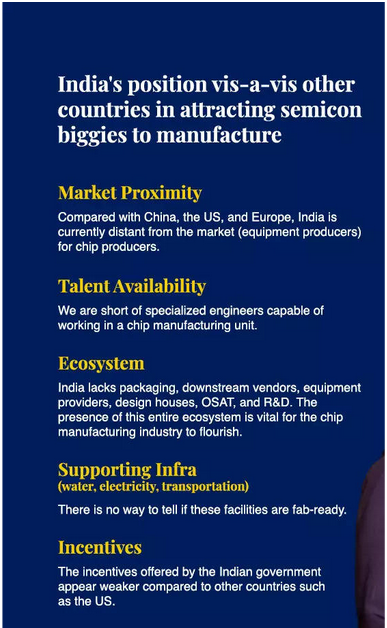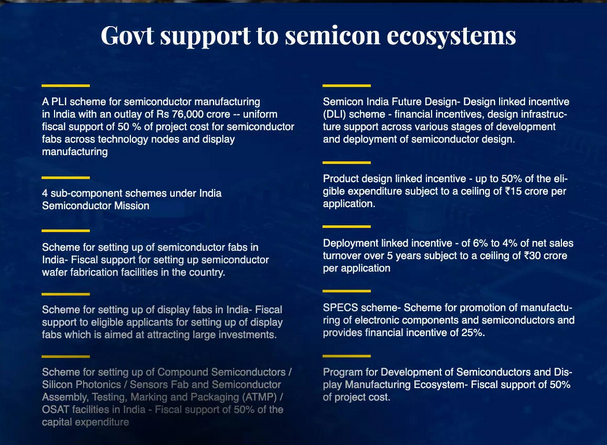GS Paper III
News Excerpt:
The Taiwanese Foreign Minister has made comments about the challenges that India needs to address before chip companies from the island territory start to commit serious investments.
Taiwan and semiconductor industry:
- Taiwan is home to some of the leading names in chipmaking, including the likes of Taiwan Semiconductor Manufacturing Company (TSMC) and United Microelectronics Corporation (UMC).
- More than 90% of the world’s most advanced chips required for almost all electronic equipment such as smartphones, car components, data centres, fighter jets and AI technologies, are made in Taiwan.
Opportunities for India:
- Since the escalation in US-China tensions, a number of companies, including from Taiwan, have been looking to diversify from Beijing and consider alternate destinations for their supply chains.
- India, which has rolled out a $10 billion chip incentive scheme, has found some success in attracting a foundry investment from Tata and PSMC, but bigger names have stayed away so far.
- Taiwan is looking at India as a potential investment destination, especially in the electronics space, but businesses from the island nation have some reservations which have stopped them from coming to India so far.
- Even in PSMC’s case, while it is offering its technology to Tata for the foundry, it has a very marginal role in the financials of putting together the plant.
Challenges faced by semiconductor industry in India:
- Cumbersome administrative structure:
- India is known to be very cumbersome in its administrative structure and it prevents many companies from investing in India.
- The regulations in India differ from state to state and sometimes it is difficult for businesses to navigate, which does present a certain level of difficulty.
- The Indian government needs to streamline laws and regulations to help semiconductor investors coming to the country.
- Lack of experienced engineers:
- Another key challenge that India needs to address is lack of trained semiconductor engineers.
- While India has a big talent pool of chip designers who work at all major global semiconductor companies, it has little to show in terms of engineers who can work on chip factory floors.
- Inadequate infrastructure:
-
- Another pressing issue plaguing the semiconductor sector in India is the lack of cutting-edge infrastructure.
- Taiwanese chip companies have red-flagged India’s lack of adequate infrastructure needed to support the task of making semiconductors.
- Infrastructure is the backbone of Taiwan’s Hsinchu Science Park, which is home to TSMC, UMC and other semiconductor companies.
- The park is dotted with their suppliers for gases, water and equipped with schools, colleges, residential complexes and a thriving night-life to incentivise engineers from around the world to stay there.
- To overcome this hurdle, the government must play a pivotal role by offering financial incentives, subsidies, and infrastructure support to encourage both domestic and foreign investments in the semiconductor industry.
- High tariffs on electronics component imports:
- The high tax rate on imports in India is an impediment in the growth of the semiconductor industry in India.
- An India-Taiwan FTA will be crucial in attracting suppliers from Taiwan to set up operations in India.

India Taiwan Free Trade Agreement:
- The idea of an FTA between India and Taiwan, especially focused on the semiconductor industry, could be beneficial for both parties.
- It could potentially lead to increased cooperation in semiconductor manufacturing, technology transfer, and research and development.
- The negotiations for the FTA are still going on and the Taiwanese government has shown very strong intention to sign the agreement.
- FTA will be crucial in attracting suppliers from Taiwan to set up operations in India.
Initiatives by the government to promote semiconductor manufacturing in India:
- The Indian government has created a dedicated task-force called the India Semiconductor Mission, which aims to serve as a focal point for an efficient implementation of India’s chip ambitions.
- All land-related clearances for the four semiconductor facilities that have been approved so far – three assembly operations that include Micron’s packaging plant and one fab – were done expeditiously, as the Centre worked with the state governments of Gujarat and Assam where these operations are being set up.
- The ground-breaking ceremony of the Tata-PSMC fab happened within two weeks of getting clearance.



